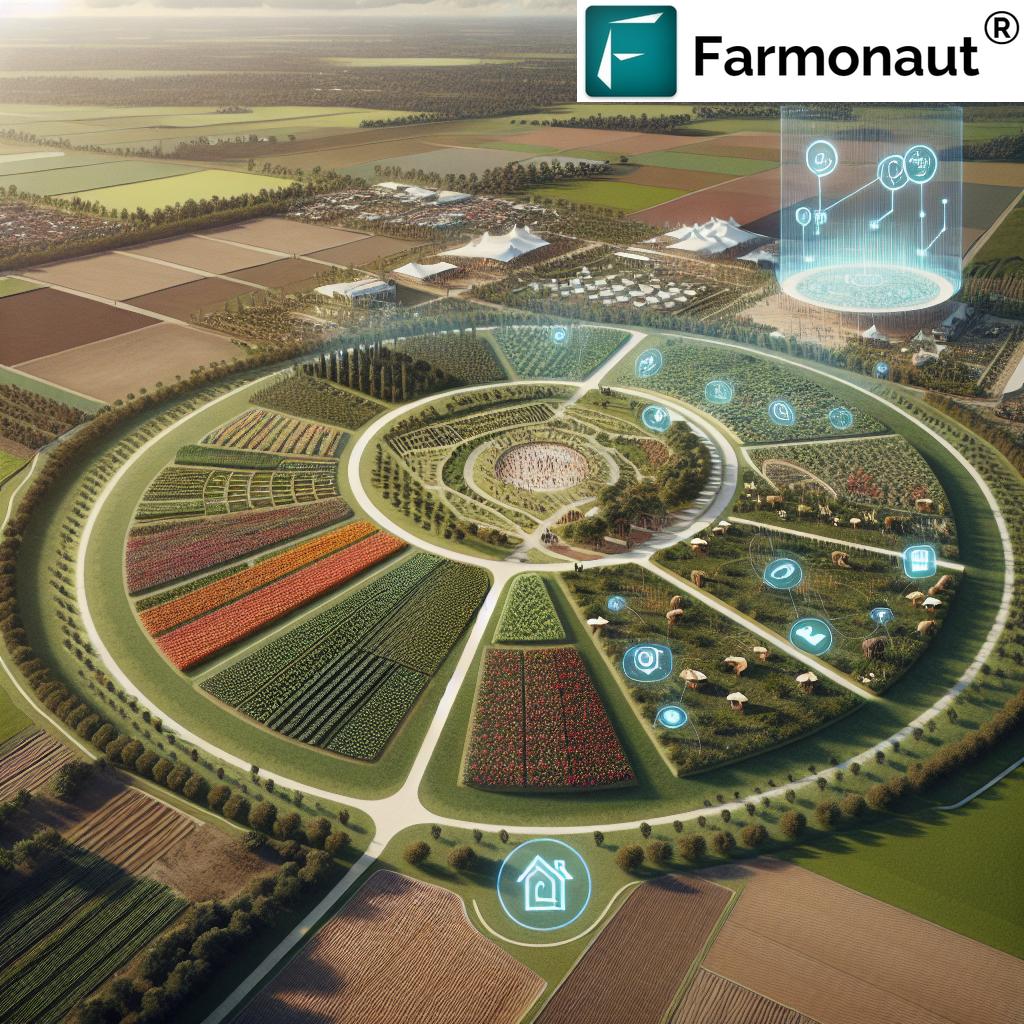Farm Diversification Dilemma: North Yorkshire Wedding Venue Proposal Sparks Local Debate on Rural Development
“Farm diversification into wedding venues can increase a farm’s revenue by up to 50% annually.”
In the heart of North Yorkshire, a proposed wedding venue at a farm near Northallerton has ignited a passionate debate, highlighting the complex interplay between rural development initiatives and community concerns. This controversy brings to light the broader challenges faced by farmers as they navigate the ever-evolving landscape of agriculture and seek innovative ways to sustain their livelihoods.
As we delve into this pressing issue, we’ll explore the latest farm diversification strategies, examine the intricacies of agritourism business planning, and discuss how cutting-edge agricultural technology solutions can support sustainable agriculture practices. Join us as we unpack the multifaceted aspects of this rural development dilemma and its implications for the future of farming in North Yorkshire and beyond.
The Wedding Venue Proposal: A Catalyst for Debate
The proposal to transform a portion of a working farm near Northallerton into a wedding venue has become a flashpoint for discussions on rural development and farm diversification. This initiative reflects a growing trend among farmers seeking to supplement their income through non-traditional agricultural activities. However, it has also raised concerns among local residents and policymakers about the potential impact on the community and the surrounding environment.

Farm Diversification Strategies: A Closer Look
Farm diversification has become an essential strategy for many agricultural businesses looking to maintain profitability in the face of changing market conditions and environmental challenges. Let’s examine some popular diversification options:
- Agritourism: This includes activities like farm tours, pick-your-own experiences, and educational programs.
- Event Venues: Converting farm buildings or land into spaces for weddings, corporate events, or festivals.
- Farm Shops: Selling produce and locally-made products directly to consumers.
- Renewable Energy: Installing solar panels or wind turbines on farmland.
- Accommodation: Offering bed and breakfast or holiday cottage rentals.
Each of these strategies comes with its own set of benefits and challenges, which we’ll explore in more detail throughout this article.
The Role of Agricultural Technology in Farm Diversification
As farmers consider diversification options, it’s crucial to recognize the role that agricultural technology can play in supporting these initiatives. Companies like Farmonaut are at the forefront of providing innovative solutions that can help farmers make informed decisions about their land use and resource allocation.
Farmonaut’s satellite-based farm management solutions offer valuable insights for farmers considering diversification:
- Real-time crop health monitoring to optimize existing agricultural operations
- AI-based advisory systems for improved decision-making
- Resource management tools to enhance efficiency across diverse farm activities
By leveraging these technologies, farmers can make data-driven decisions about which areas of their land are best suited for traditional farming and which might be appropriate for diversification projects like wedding venues or other agritourism initiatives.
Community Concerns and Local Planning Policies
The proposed wedding venue near Northallerton has raised several concerns among local residents and council members. These include:
- Noise pollution: Fears about disruption to the quiet rural environment
- Road safety: Increased traffic on narrow country lanes
- Conservation: Potential impact on local wildlife and natural habitats
- Character of the area: Concerns about changing the rural landscape
These issues highlight the need for careful consideration of local planning policies and the importance of balancing economic development with community well-being and environmental conservation.
The Economic Impact of Farm Diversification
While community concerns are valid, it’s essential to consider the potential economic benefits of farm diversification:
- Creation of new jobs in rural areas
- Increased local tourism and associated spending
- Support for local suppliers and businesses
- Preservation of farming livelihoods and rural communities
“Over 60% of UK farmers are considering diversification strategies to supplement their agricultural income.”
This statistic underscores the growing importance of diversification in the agricultural sector. As farmers face increasing economic pressures, finding alternative revenue streams becomes crucial for the sustainability of rural economies.
Balancing Tradition and Innovation in Agriculture
The wedding venue proposal in North Yorkshire represents a broader trend of farmers seeking to balance traditional agricultural practices with innovative business models. This balance is critical for the long-term viability of farming communities.
Farmonaut’s agricultural technology solutions can play a pivotal role in this balancing act. By providing farmers with detailed insights into their land and crops, these tools enable more efficient use of resources, potentially freeing up land and capital for diversification projects.

Access Farmonaut’s cutting-edge agricultural solutions:
Sustainable Agriculture Practices in Farm Diversification
As farms diversify, maintaining sustainable agriculture practices becomes even more critical. Farmonaut’s precision farming techniques can help farmers:
- Optimize water usage through accurate soil moisture monitoring
- Reduce chemical inputs by identifying areas of crop stress
- Minimize soil erosion through better land management
These practices not only support environmental conservation but also align with the growing consumer demand for sustainably produced goods and services.
Farm Event Management: Challenges and Opportunities
For farmers considering diversification into event venues, effective farm event management is crucial. This involves:
- Developing a comprehensive business plan
- Navigating complex licensing and insurance requirements
- Implementing sound marketing strategies
- Managing seasonal fluctuations in demand
While challenging, successful event management can provide a significant boost to farm income and local employment opportunities.
The Role of Local Government in Rural Development
Local councils play a crucial role in shaping rural development initiatives. In the case of the North Yorkshire wedding venue proposal, the council must consider:
- Compliance with existing planning policies
- Environmental impact assessments
- Traffic management plans
- Noise control measures
Balancing these considerations with the need for economic development requires careful deliberation and community engagement.
Innovative Farming Techniques and Their Impact on Diversification
As farmers explore diversification options, innovative farming techniques can provide valuable support. Farmonaut’s smart farming innovations offer:
- Crop management systems for optimized yield
- Agricultural data analytics for informed decision-making
- Remote sensing capabilities for large-scale farm monitoring
These technologies not only improve traditional farming operations but also free up resources that can be directed towards diversification projects.
Agritourism Business Planning: Key Considerations
For farmers venturing into agritourism, including wedding venues, thorough business planning is essential. Key aspects to consider include:
- Market research and target audience identification
- Financial projections and funding options
- Infrastructure and facility requirements
- Marketing and promotion strategies
- Compliance with health and safety regulations
Successful agritourism ventures can provide a steady income stream while showcasing the beauty and value of rural landscapes.
The Future of Farming: Embracing Technology and Diversification
As we look to the future of farming, it’s clear that a combination of technology adoption and strategic diversification will be key to success. Farmonaut’s agricultural technology solutions offer farmers powerful tools to optimize their operations and make informed decisions about land use.
Explore Farmonaut’s API solutions for developers:
Farmonaut API
API Developer Docs
By leveraging these technologies, farmers can:
- Identify optimal areas for crop production
- Determine suitable locations for diversification projects
- Monitor the impact of new initiatives on overall farm health
Farm Diversification Strategies Comparison
| Diversification Strategy | Estimated Initial Investment (£) | Potential Annual Revenue (£) | Community Impact (1-5) | Environmental Impact (1-5) | Planning Complexity (1-5) | Compatibility with Existing Farm Operations (1-5) |
|---|---|---|---|---|---|---|
| Wedding Venue | 100,000 – 500,000 | 50,000 – 200,000 | 4 | 3 | 5 | 3 |
| Farm Shop | 20,000 – 100,000 | 30,000 – 150,000 | 3 | 2 | 2 | 5 |
| Agritourism (Farm Tours) | 10,000 – 50,000 | 20,000 – 100,000 | 4 | 2 | 3 | 4 |
| Renewable Energy (Solar) | 50,000 – 200,000 | 10,000 – 50,000 | 2 | 5 | 4 | 4 |
| Holiday Accommodation | 50,000 – 250,000 | 30,000 – 150,000 | 3 | 3 | 4 | 3 |
Conclusion: Navigating the Farm Diversification Dilemma
The debate surrounding the proposed wedding venue near Northallerton exemplifies the complex challenges facing rural communities as they seek to balance tradition with innovation, economic development with environmental conservation, and individual enterprise with community well-being.
As farmers continue to explore diversification strategies, it’s clear that a multifaceted approach is necessary. This approach should incorporate:
- Careful consideration of community impacts
- Adherence to local planning policies
- Adoption of sustainable agriculture practices
- Utilization of advanced agricultural technologies
- Engagement with local stakeholders
By embracing these principles and leveraging tools like Farmonaut’s agricultural technology solutions, farmers can navigate the complexities of diversification while contributing to the long-term sustainability and prosperity of rural communities.
As we move forward, it’s essential that all stakeholders – farmers, local residents, policymakers, and technology providers – work together to create a future for agriculture that is both innovative and respectful of rural traditions and landscapes. The farm diversification dilemma in North Yorkshire serves as a valuable case study for rural communities worldwide, highlighting the need for balanced, thoughtful approaches to agricultural development in the 21st century.
FAQ Section
Q: What are the main benefits of farm diversification?
A: Farm diversification can provide additional income streams, reduce reliance on traditional farming activities, create new job opportunities, and help maintain the viability of rural communities.
Q: How can technology support farm diversification efforts?
A: Agricultural technology solutions like those offered by Farmonaut can help farmers optimize their existing operations, identify suitable areas for diversification projects, and make data-driven decisions about resource allocation.
Q: What are the main concerns surrounding farm diversification projects like wedding venues?
A: Common concerns include noise pollution, increased traffic, impact on local wildlife, and changes to the rural character of an area.
Q: How can farmers address community concerns about diversification projects?
A: Farmers can engage in open dialogue with local residents, conduct thorough impact assessments, implement mitigation measures, and ensure compliance with local planning policies.
Q: What role do local councils play in farm diversification initiatives?
A: Local councils are responsible for reviewing planning applications, ensuring compliance with local policies, considering community feedback, and balancing economic development with environmental and social concerns.
















